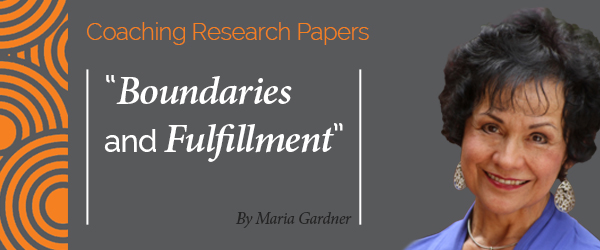 Research Paper By Maria Gardner J
Research Paper By Maria Gardner J
(Relationships & Boundaries For Freedom Coach, UNITED STATES)
Premise: Boundaries are an essential component of a plan to achieve a fulfilled life.
Personal assumptions:
- A fulfilled life is a worthy goal.
- A fulfilled life requires healthy relationships and community contribution.
- A fulfilled life is pursued either proactively or reactively by rational people.
- Proactive pursuit is more effective than reactive pursuit for achieving long-term fulfillment.
- Life continually confronts rational people with an array of choices – each with its own set of consequences and secondary choices.
The premise, as stated, implies the need for a plan to achieve a fulfilled life. This implication flows logically from the complexity of life’s abundant choices. The lack of a plan in an achievement-driven person frequently results in the attempt to crowd every appealing option into life. This has unintended consequences.
Avoid overload
Sociologist Alvin Toffler states,
Researchers agree on two basic principles: first, that man has limited capacity; and second, overloading the system leads to serious breakdown of performance.
Camels are able to carry great loads. If, however, a mere straw is placed on a camel maximally loaded down, its back will be broken. The back is not broken by the proverbial straw. It is broken by overload. …Exceeding one’s threshold will result in disorganization or frustration. …Emotional overload saps our strength, paralyzes our resolve, and maximizes our vulnerability, leaving the door open for even further margin erosion. Swenson, R, MD, 1992, Margin, Navpress, Colorado Springs, Colorado
Priority planning
Planning is superior to aimless reacting.
Take initiative and be responsible for your own life. A proactive person’s behavior is a product of their own conscious choice, based on values, rather than a product of their conditions, based on feeling. …Plans for a vacation don’t begin at the airport, Covey, S, 1989, The 7 Habits of Highly Effective People, Simon and Schuster, New York, NY
In order for a client to take initiative and be responsible, he/she must define values, which leads to establishing priorities.
Coaching Questions:
- What gives you energy?
- What are you most passionate about?
- What one thing do you want to accomplish from being coached?
- What changes do you think are necessary for a satisfactory result?
- How would you describe a plan that would help you pursue your goals?
- Have you rank ordered your priorities? Do you want to explore them? (Consider using the Wheel of Life.)
- How do you think you will feel when you have clarity on your priorities and can create a plan to fulfill them?
That’s a great beginning. I look forward to celebrating these life changes with you.
Do not allow “urgencies” to take precedence over priorities…urgencies are like people who cut in front of you in a line. They think that their needs are more important than your planned priorities. …Time is wasted when one doesn’t plan and prioritize before their day begins. A prioritized plan is the way to gain control. Effectively planning gives you more freedom to effectively handle a day’s urgencies, not less! Covey, F, available at http://franklincovey.com/tc/events.com
It can be argued that your true priorities are what you act on rather than what you list in an idealistic, abstract exercise. An audit of your calendar and checkbook reveal the realities. If their current state is not satisfactory, change is required.
You change for one of two reasons: Either you learn enough that you want to, or you’ve been hurt enough that you have to. – Unknown.
Coaching Questions:
- What do you know needs to be changed?
- How ready are you to do the hard work to move forward?
- What is the first area you want to discuss?
- How can you dissect this issue into bite-size pieces?
- What plan can you put into place to begin this new direction?
I’m excited to support you as you peel away the layers of the old to a new-found freedom.
We change our behavior when the pain of staying the same becomes greater than the pain of changing. Consequences give us the pain that motivates us to change. Cloud, H (online) http://www.cloudtownsend.com